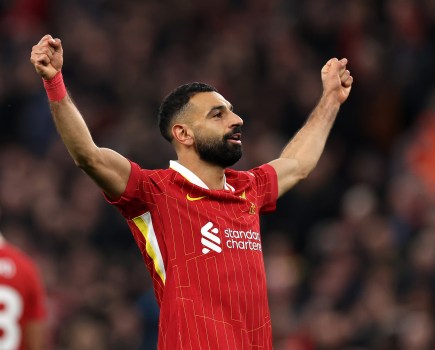 Saturday, November 3, 2012. In a game where Ajax never looked like the better team, Ivorian sensation Wilfried Bony has just scored his second goal, giving Vitesse a comfortable 2-0 lead over the Dutch champions. The atmosphere in the stadium reaches a low, and much like a spoilt child, a fraction of the Ajax supporters start their booing and their whistling.
Saturday, November 3, 2012. In a game where Ajax never looked like the better team, Ivorian sensation Wilfried Bony has just scored his second goal, giving Vitesse a comfortable 2-0 lead over the Dutch champions. The atmosphere in the stadium reaches a low, and much like a spoilt child, a fraction of the Ajax supporters start their booing and their whistling.
A sense of entitlement is part of the Amsterdammer’s DNA, as many Dutch football watchers will tell you, and these Amsterdammers have seen the likes of Johan Cruyff, Marco van Basten and Dennis Bergkamp play. They’ve won the Champions League four times, they’ve been crowned champions of The Netherlands a record-breaking 31 times. How can they do anything but voice their disapproval? They expect to see the best, but what they’re witnessing is a somewhat nervous bunch of young kids.
Unmoved, Ajax manager Frank de Boer substitutes veteran midfielder Christian Poulsen, and calls not for Miralem ’16.5 million’ Sulejmani (the Serbian former star made to watch from the stands) but eighteen year old Viktor Fischer to take his place. The booing and the whistling stops; unbridled optimism returns. Not because the crowd expects Fischer to score a hat-trick and miraculously save this match for the Amsterdammers, no, something rather more symbolic is going on, something just short of religious. Johan Cruyff, El Salvador, is telling the people it’s all going to be alright.
More than two years after starting the ‘velvet revolution’ that turned rather bloody after the legendary number fourteen ousted the chairman and no more than two boards of directors from the club, Cruyff’s status in the Amsterdam Arena is now that of God. What he says goes, and what he is saying is that Ajax’ main strength has always been it’s youth programme. Amidst galácticos policies and Arab millions, the club’s only chance at coming close to a position resembling their early seventies and mid nineties hegemony is through their youngsters. Ajax must cherish them, so the Cruyff-doctrine states, and privilege them over overpaid superstars like the aforementioned Sulejmani. ‘He who isn’t strong, must be smart,’ as one of Cruyff’s many aphorisms goes.
As anyone affiliated with Ajax knows, these youngsters are not only to be found in the streets of Amsterdam, or even the outskirts of the Dutch province. Scouting in Scandinavia – or more specifically, Denmark – has proven to be quite fruitful too. Older fans will recall Søren Lerby, younger fans Christian Eriksen. If all goes according to plan, future fans might one day recall Viktor Fischer. Maybe they’ll sit back in their armchairs, take a sip from their glass of jenever, and tell their grandchildren about the legendary blonde Dane who led Ajax to their thirty second league title, as well as the semi-final of the Champions League, which they lost to a Manchester City squad worth 2.4 billion – but only after extra time.
Alas, this hypothetical, utopian future is still far away. Today, it is Saturday, November 3, 2012. It’s very cold, and Ajax have just lost to Vitesse. The players are back in the dressing room and Frank de Boer is calmly explaining his youngsters where it all went wrong. For good measure, he gives one of the few older players a telling off (they’re in on it). Only a slight one though, they mustn’t scare the youngsters. And the fans? They’re happy, despite Ajax currently being in fifth place in the Eredivisie. Johan Cruyff is in charge, and as El Salvador has repeatedly stated: developing top class players costs time. The Ajax staff, a small army of Cruyff adepts, are working hard at it. It knows football. This is not any kind of small army, this small army has former world stars Wim Jonk (youth coach), Marc Overmars (director of finance) and Dennis Bergkamp (assistant manager) amongst its generals.
In a video clip published in the club webzine in May 2012, Ajax demonstrated just how it goes about granting the youngsters their time. The clip shows Fischer in his house in the town of Ouderkerk aan de Amstel, where he lives with foster parents, a friendly couple that also housed Jan Vertonghen before he reached adulthood. “I get up at nine,” Fischer tells the TV-crew. “Then I try to do one or two hours of schoolwork. After that, I head out to the training ground.”
Fifteen minutes separate the picturesque Ouderkerk aan de Amstel from De Toekomst (‘The Future’). The clip shows Fischer cycling past green pastures, black and white cows and canals that look like they belong in a Rembrandt painting. After arriving at the ground, he steps off his bicycle, locks it and strolls through the gate.
“I have my family and my girlfriend in Denmark,” Fischer explains. “So at the beginning, it was very difficult here. But now I really enjoy myself. When I moved in with my foster parents things started getting better. I talk to my foster parents a lot. They are really nice,”
Could anyone think of a better way to prepare for a career as a top class player? A nice foster family, one or two hours of schoolwork, a 15 minute bicycle ride, then a day of training with the likes of Frank de Boer and Dennis Bergkamp?
“In time, I might go out with the other players. Go into town or something,” Fischer tells the camera while stuffing a towel and some socks into his bag.
Take your time, young Viktor. Right now, nobody expects you to score a hat-trick against Vitesse. Just wait for the future. Maybe one day, you really will lead Ajax to a new championship, and by doing so earn yourself a move to the Premier League – much like Jan Vertonghen before you. Maybe one day, you really will lead Ajax to a Champions League semi-final against a Manchester City side worth 2.4 billion.
By Elko Born
This article originally appeared in In Bed with Maradona






